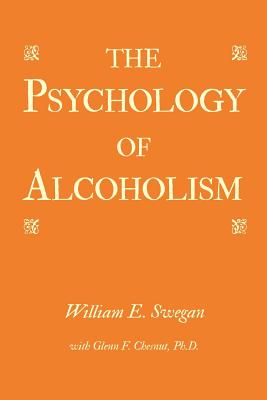The Psychology of Alcoholism

The Psychology of Alcoholism
William E. Swegan ("Sgt. Bill") was the major spokesman for the psychological wing of early Alcoholics Anonymous-that group within the newborn A.A. movement of the 1930's, 40's and 50's which stressed the psychotherapeutic side of the twelve step program instead of the spiritual side. This book is Swegan's major work, in which he lays out the psychiatric theories which formed the foundation of that variety of A.A. thought. He also talks about his association with Mrs. Marty Mann, Yev Gardner, E. M. Jellinek at the Yale School of Alcohol Studies, Bill Dotson (A.A. No. 3) and Searcy Whaley, in addition to recording his memories of the year he spent observing Sister Ignatia at work at St. Thomas Hospital in Akron.
In 1953 Sgt. Bill teamed up with famous American psychiatrist Louis Jolyon "Jolly" West at Lackland Air Force Base in San Antonio, Texas, to develop a method of alcoholism treatment (given further development in the mid 1960s by Dr. Joseph J. Zuska and Dick Jewell at Long Beach Naval Station) called the Lackland-Long Beach Model. It became one of the three basic types of A.A.-oriented alcoholism treatment program, along with the Minnesota Model and Sister Ignatia's more spiritually oriented approach.
Sgt. Bill does not just talk psychiatric theories in this book. He uses his own life story to show how traumatic loss, poverty, inadequate selfesteem, envy, self-pity and rage can drive children and youths into isolationism, rebellion, self-sabotage, and ultimately the descent into uncontrollable alcoholism or drug addiction. But in his humanistic understanding of the twelve step program he also shows us how to make use of the healing power of the spirit of Love and Service to our fellow human beings to restore ourselves to new life.
PRP: 123.69 Lei
Acesta este Prețul Recomandat de Producător. Prețul de vânzare al produsului este afișat mai jos.
98.95Lei
98.95Lei
123.69 LeiLivrare in 2-4 saptamani
Descrierea produsului
William E. Swegan ("Sgt. Bill") was the major spokesman for the psychological wing of early Alcoholics Anonymous-that group within the newborn A.A. movement of the 1930's, 40's and 50's which stressed the psychotherapeutic side of the twelve step program instead of the spiritual side. This book is Swegan's major work, in which he lays out the psychiatric theories which formed the foundation of that variety of A.A. thought. He also talks about his association with Mrs. Marty Mann, Yev Gardner, E. M. Jellinek at the Yale School of Alcohol Studies, Bill Dotson (A.A. No. 3) and Searcy Whaley, in addition to recording his memories of the year he spent observing Sister Ignatia at work at St. Thomas Hospital in Akron.
In 1953 Sgt. Bill teamed up with famous American psychiatrist Louis Jolyon "Jolly" West at Lackland Air Force Base in San Antonio, Texas, to develop a method of alcoholism treatment (given further development in the mid 1960s by Dr. Joseph J. Zuska and Dick Jewell at Long Beach Naval Station) called the Lackland-Long Beach Model. It became one of the three basic types of A.A.-oriented alcoholism treatment program, along with the Minnesota Model and Sister Ignatia's more spiritually oriented approach.
Sgt. Bill does not just talk psychiatric theories in this book. He uses his own life story to show how traumatic loss, poverty, inadequate selfesteem, envy, self-pity and rage can drive children and youths into isolationism, rebellion, self-sabotage, and ultimately the descent into uncontrollable alcoholism or drug addiction. But in his humanistic understanding of the twelve step program he also shows us how to make use of the healing power of the spirit of Love and Service to our fellow human beings to restore ourselves to new life.
Detaliile produsului









